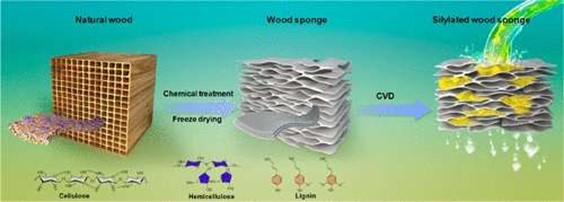
Wood sponge
Oil spills and industrial discharge into water bodies are common phenomena. Even though water and oil are immiscible, separating the two components to restore the purity of water bodies can be challenging.
To tackle this long sustained issue, researchers have developed sponges made out of wood that selectively absorb oil. These sponges are reusable.
With a spring-like lamellar structure, these sponges can be repeatedly squeezed without structural failure.
Xiaoqing Wang led the team at the Chinese Academy of Forestry to remove hemicellulose and lignin from the cell walls of balsa wood using certain chemicals. This led to the creation of a cellulose skeleton, a highly porous structure which was then freeze dried. Once freeze dried, the team grew a water-repelling polymer within the pores via a silylation process.
The material is able to absorb oil up to the equivalent of 41 times its own weight. This figure varies based on the type of oil it is being used against. Based on rigorous testing and multiple trials, the sponge is always able to absorb at least 16 times its weight. In addition, the sponge could endure at least 10 cycles of absorption and squeezing. After 10 uses, the sponge would still produce results but with lesser efficiency.
Once the sponge is no longer usable, it is safely biodegradable, without leaving behind any harmful components.
The results of this research have been reported in ACS Nano.






